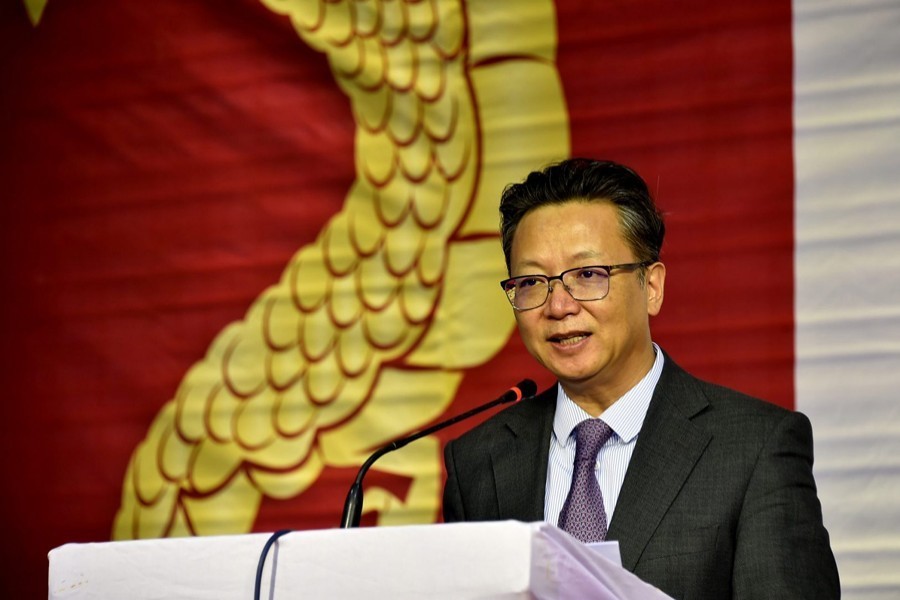Chinese Ambassador to Dhaka Li Jiming said People's Republic of China and Communist Party of China respect and protect human rights of all people, including those in Xinjiang.
"However, Xinjiang-related issues have nothing to do with human rights, ethnic groups or religions, but everything with fighting against violent terrorism, separatism and extremism," he said while speaking as the chief guest at a webinar on Thursday.
Bangladesh-China Silk Road Forum (BCSRF) organised the webinar - "Western Countries including USA are playing Xinjiang card against Chinese Sovereignty".
He said unlike what some of the Western media and politicians spread, Xinjiang is just the model of human
rights protection in terms of civil, political, economic and cultural rights as well as rights to education, social rights, rights of women and children, and freedom of religious belief.
Since the end of 2018, more than 1,000 people in over 70 groups, including officials from the United Nations, members of foreign diplomatic missions in China, permanent representatives to the UN and other international organisations in Geneva, journalists and representatives of faith-based groups, have visited Xinjiang.
"They represent over 90 countries."
The Chinese envoy noted that they spoke highly of the counter-terrorism and de-radicalisation measures in Xinjiang.
He alleged that the US was involved in starting propaganda against China by playing the 'Xinjiang card' in the midst of the Covid-19 pandemic despite its conspicuous and questionable silence on other Muslim-related issues, including Kashmir and Palestine. "The US fears the unity between the Confucian and Islamic civilisations."
The purpose to play the 'Xinjiang card' was to divide and undermine China as well as to create misunderstandings between China and the neighbouring Muslim countries, along with the Belt and Road Initiative (BRI) states, he added.
BCSRF Chairman Dilip Barua, presiding over the webinar, said peace of Xinjiang is a matter of integrity, national unity, and national security of China.
He opined that the anti-terrorism policies in Xinjiang turned out to be effective until now. But there are still threats and challenges of terrorism, secessionism and religious extremism, which are obstacles to its long-term stability.
Xinjiang is in a strategic and pivotal location for the BRI, and it is China's gateway to the Middle East, Central Asia and Europe, he mentioned.
Rashed Khan Menon, President of Workers Party of Bangladesh, said: "We understand the motives behind the western propaganda against Xinjiang province - home to Uighur Muslims, while such campaign is also common for places like Tibet."
The Western world has long been trying to aggregate Muslim extremists in some parts of the Chinese province to mount pressure on the country.
"Western powers have been engaged in wars across the world to fortify their supremacy. In the same way, they are now trying to create a cold war situation with China - fearing its fast economic development," he added.
Dipak Ranjan Datta, former chairman of the Bangladesh Chemical Industries Corporation (BCIC), said the Western countries played the human rights card with the help of their dominance in public opinions. However, their hypocrisy on the stance of human rights is exposed.
Abu Abdullah, a civil society representative, said to bring the underprivileged ethnic minorities in the main stream of economy, the Chinese government has been providing vocational trainings to them through constructing specialised training camps.
But the western media has been underlining the training centres as concentration camps for those ethnic groups to wipe out their culture and religious rights.
Such misinterpretation and misinformation can only be dissolved, if scopes of interaction with those ethnic people are provided to the outer world, he further said.
BCSRF Acting Secretary General A B M Khorshed Alam moderated the discussion. He said from his visits to China, he observed that the country has religious freedom, especially for the Muslim population.
Mushahed Ahmed, Politburo member of Bangladesher Samyabadi Dal, said a section of western powers has been trying to create instability in Xinjiang region in the name of religious extremism.
Despite Chinese intervention to stabilise situation, the western countries are still doing politics with the issue, he opined.
[email protected], [email protected]


